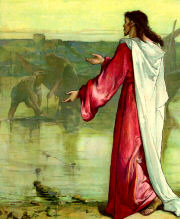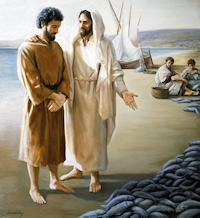» Enjoy our Liturgical Seasons series of e-books!
"When it was already dawn, Jesus was standing on the shore; but the disciples did not realize that it was Jesus." For the third time Jesus appears to His disciples and on the lake of Genesareth renews the miraculous draught of fishes. The Fathers did not fail to see in the one hundred and fifty-three great fishes that Peter brought to land the neophytes born to supernatural life in the waters of baptism and brought by Peter to the feet of the risen Christ.
Sunday Readings
The first reading is taken from the Acts of the Apostles, 5:27-32, 40b-41. The Apostles' failure to obey the Sanhedrin is obviously not due to pride or to their not knowing their place; the Sanhedrin is imposing a ruling which would have them go against God's law and their own conscience.
The Apostles humbly and boldly remind their judges that obedience to God comes first. They know that many members of the Sanhedrin are religious men, good Jews who can understand their message; they try not so much to justify themselves as to get the Sanhedrin to react: they are more concerned about their judges' spiritual health than about their own safety. St. John Chrysostom comments: "God allowed the Apostles to be brought to trial so that their adversaries might be instructed, if they so desired...The Apostles are not irritated by the judges; they plead with them compassionately, with tears in their eyes, and their only aim is to free them from error and from divine wrath(Hom. on Acts, 13).
— The Navarre Bible - Acts of the Apostles
The second reading is from the Book of Revelation, 5:11-14. The host of angels around the throne act as a kind of guard of honor proclaiming the sublime perfection of Christ the Lamb; they list seven attributes which all point to the fact that he has everything that belongs to the Godhead.
After the song of the spiritual, invisible, creation, there follows the hymn of the material, visible, world. This hymn...is addressed to him who sits upon the throne. It thereby puts on the same level God and the Lamb, whose Godhead is being proclaimed. This marks the climax of the universal, cosmic praise that is rendered the Lamb. The emphatic "Amen!" of the four living creatures, and the worship offered by the elders bring this introductory vision to a close.
— The Navarre Bible - Revelation
 The Gospel is from St. John, 21:1-19, which tells us of a third apparition, wherewith seven of the eleven were favored. ...The seven disciples are fishing: it is the Church working out her apostolate. Peter is the master-fisherman; it belongs to him to decide when and where the nets are to be thrown. The other six Apostles unite with him in the work, and Jesus is with them all, looking upon their labor, and directing it, for whatever is procured by it is all for him. The fish are the faithful, for, as we have already had occasion to remark, the Christian was often called by this name in the early ages. It was the font, it was water, that gave him his Christian life. ...There is a mystery, too, in the number of the fishes that are taken; but what it is that is signified by these hundred and fifty-three we shall perhaps never know, until the day of judgment reveals the secret. They probably denote some divisions or portions of the human race, that are to be gradually led, by the apostolate of the Church, to the Gospel of Christ: but, once more, till God's time comes, the book must remain sealed.
The Gospel is from St. John, 21:1-19, which tells us of a third apparition, wherewith seven of the eleven were favored. ...The seven disciples are fishing: it is the Church working out her apostolate. Peter is the master-fisherman; it belongs to him to decide when and where the nets are to be thrown. The other six Apostles unite with him in the work, and Jesus is with them all, looking upon their labor, and directing it, for whatever is procured by it is all for him. The fish are the faithful, for, as we have already had occasion to remark, the Christian was often called by this name in the early ages. It was the font, it was water, that gave him his Christian life. ...There is a mystery, too, in the number of the fishes that are taken; but what it is that is signified by these hundred and fifty-three we shall perhaps never know, until the day of judgment reveals the secret. They probably denote some divisions or portions of the human race, that are to be gradually led, by the apostolate of the Church, to the Gospel of Christ: but, once more, till God's time comes, the book must remain sealed.
Having reached the shore, the Apostles surround their beloved Master, and lo! he has prepared them a repast: bread, and a fish lying on hot coals. This fish is not one of those they themselves have caught; they are to partake of it now that they have come from the water. The early Christians thus interpret the mystery: the fish represents Christ, who was made to suffer the cruel torments of the Passion, and whose love of us was the fire that consumed him; and he became the divine food of them that are regenerated by water. We have elsewhere remarked, that in the primitive Church, the Greek word for fish (Ichthus) was venerated as a sacred symbol, inasmuch as the letters of this word formed the initials of the titles of our Redeemer.
But Jesus would unite, in the same repast, both the divine Fish, which is himself, and those other fishes, which represent all mankind, and have been drawn out of the water in Peter's net. The Paschal feast has the power to effect, by love, an intimate and substantial union between the Food and the guests, between the Lamb of God and the other lambs who are his brethren, between the divine Fish and those others that he has associated with himself by the closest ties of fellowship. They, like him, have been offered in sacrifice; they follow him in suffering and in glory. Witness the great deacon Laurence, around whose tomb the faithful are now assembled. He was made like to his divine Master when he was burnt to death on his red-hot gridiron; he is now sharing with him in an eternal Pasch, the glories of Jesus' victory, and the joys of his infinite happiness.
— The Liturgical Year, Abbot Gueranger O.S.B.
Meditation for the Third Sunday of Easter
On the road to Emmaus: Jesus, alive and at our side
The Gospel of today’s Mass presents us with another appearance of Jesus on the evening of his Resurrection. Two disciples are making their way to the village of Emmaus, having lost all hope because Christ, in whom they had placed the whole meaning of their lives, was dead. Our Lord catches up with them, as if He too were just another traveler on the road, and walks with them without being recognized. They engage in broken conversation, as happens when people talk as they are going along. They speak about their preoccupation: what has happened in Jerusalem on the Friday evening—the death of Jesus of Nazareth. The Crucifixion of Our Lord had been a very severe test for the hopes of all those who considered themselves to be his disciples and who to some extent or another had placed their trust in him. Things had all taken place very quickly and they still hadn’t got over all they had seen with their very eyes.
These men who are returning to their home village after having celebrated the Paschal feast in Jerusalem show by the tone of their conversation their great sadness and how discouraged and disconcerted they are: We had hoped that he was the one to redeem Israel. But now they speak of Jesus as a reality belonging to the past:
Concerning Jesus of Nazareth, who was a prophet mighty in deed…Notice the contrast. They say ‘who was!’…And He is there by their side. He is walking with them, in their company, trying to uncover the reason, the most intimate roots of their sadness!’Who was!’, they say. We too, if only we would examine ourselves sincerely, with an attentive examination of our sadness, our discouragement, our being a little tired of life, would find a clear link with this Gospel passage. We would discover how we spontaneously remark ‘Jesus was’, ‘Jesus said’, because we forget that, just as one the road to Emmaus, Jesus is alive and by our side at this very moment. This is a discovery which enlivens our faith and revives our hope, a finding that points to Jesus as a joy that is ever present: Jesus is, Jesus prefers, Jesus says, Jesus commands now at this very moment (A. G. Dorronsoro, God and People)
Jesus lives.
These men did know about Christ’s promise of rising on the third day. They had heard that morning the message of the women who had seen the empty tomb and the angels. Things had been sufficiently clear for them to have nourished their faith and their hope; but instead, they speak of Christ as belonging to the past, as a lost opportunity. They are a living picture of discouragement. Their minds are in darkness and their hearts are numbed.
Christ Himself—whom they did not at first recognize but whose company and conversation they accept—interprets those events for them in the light of the Scriptures. Patiently He restores in them their faith and their hope. And the two of them recover also their joy and their love: Did not our hearts burn within us, they say later, while he talked to us on the road, while he opened to us the scriptures?
It is possible that we too may sometimes meet with discouragement and lack of hope because of defects that we cannot manage to root out, or of difficulties in the apostolate or in our work that seem to be insurmountable…. On these occasions, provided we allow ourselves to be helped, Jesus will not allow us to be parted from him. Perhaps it will be in spiritual direction, once we open our souls in all sincerity, that we will come to see Our Lord again. And with him there will always come joy and the desire to begin again as soon as possible: And they rose that same hour and returned to Jerusalem. But it is essential that we allow ourselves to be helped, and that we are ready to be docile to the advice that we receive.
—Francis Fernandez, In Conversation with God, Daily Meditations Volume Two: Lent-Holy Week-Eastertide






